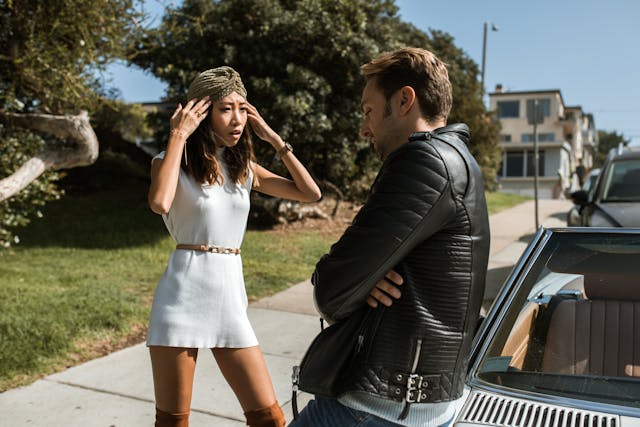Emotional abuse isn’t always loud, obvious, or easy to spot, which is part of what makes it so insidious.

Sometimes, it has nothing to do with yelling or outright cruelty. Instead, it’s all about quiet manipulation, subtle control, and patterns that slowly wear you down over time. Covert emotional abuse is especially hard to recognise because it can be disguised as concern, teasing, or even “love.” But if you constantly feel confused, drained, or like you’re never quite good enough, something is definitely off. Here are some of the more hard-to-spot signs of emotional abuse. If you think you might be a victim of this behaviour, don’t hesitate to reach out for help. The National Domestic Abuse Helpline is available 24/7 at 0808 2000 247.
1. They dismiss your feelings as “overreacting.”

If someone constantly tells you that you’re being dramatic, too sensitive, or reading too much into things, it’s a form of gaslighting. After a while, you start questioning your own emotions, wondering if you’re really upset or just imagining things. (You are, and you’re not.) Healthy relationships don’t require you to justify your feelings every time you express them. If someone always makes you feel like your emotions are an inconvenience, that’s a sign of manipulation, not concern.
2. They make “jokes” that don’t feel funny.

Covert emotional abuse often comes in the form of disguised insults — comments made as “jokes,” but with just enough sting to hurt. If you call them out, they flip it back on you: “Can’t you take a joke? You’re too sensitive.” But deep down, you know it’s not just humour. A joke is meant to be fun for both people, not a way to belittle you while making it seem harmless. If no one’s laughing, it’s not exactly hilarious, is it?
3. They subtly control how you spend your time.

They might not outright forbid you from seeing friends or doing certain things, but they’ll make you feel bad about it. Maybe they guilt-trip you, act annoyed, or question why you’d want to go in the first place. In the end, you might start avoiding plans just to keep the peace. If you feel like your choices are constantly under scrutiny, that’s a warning sign.
4. They give you backhanded compliments.

Instead of outright criticism, they disguise it as “just being honest.” You’ll hear things like, “You actually look good in that for once,” or “I didn’t expect you to do so well, but good for you!” These comments make you feel uneasy rather than appreciated. They’re not meant to encourage or congratulate you; they’re meant to keep you feeling slightly unsure of yourself. If they can keep you from becoming too confident, they can continue calling the shots, and that’s how they like it.
5. They use the silent treatment as punishment.

Instead of actually talking about issues, they withdraw, going cold, ignoring you, or making you guess what you supposedly did wrong. It’s not because they’re needing space; it’s because they’re trying to control the situation and you. You’re left feeling anxious, trying to win back their approval. If someone constantly makes you feel like you have to “earn” their attention after upsetting them, without even knowing what you did, it’s emotional manipulation.
6. They ignore or belittle your achievements.

Maybe you get a promotion, achieve a personal goal, or do something you’re proud of, and instead of celebrating, they make it seem like it’s not really a big deal. They might say, “Well, anyone could have done that” or “I thought it was something bigger.” The more it happens, the more this makes you question whether your successes even matter. A supportive person lifts you up; a covertly abusive one makes sure you never feel too proud.
7. They shift blame onto you, even when it’s clearly their fault.

If they mess up, they never take responsibility. Instead, they find a way to spin it back on you. Maybe you “made” them act that way, or they wouldn’t have done it if you hadn’t “pushed them.” It’s exhausting when every issue, no matter how clearly theirs, somehow becomes your fault. It makes you question your own reality, which is exactly the point. Don’t accept it!
8. They subtly compare you to other people, and never in a flattering way.

They might say things like, “Why can’t you be more like [someone else]?” or “[Ex’s name] never had an issue with this.” These aren’t direct attacks, but they plant the idea that you’re not good enough as you are. In a healthy relationship, you’re valued for who you are, not measured against other people as a way to make you feel inadequate. You don’t need to compare yourself to anyone else, and they certainly shouldn’t be doing it. It’s never okay.
9. They make you feel guilty for setting boundaries.

Whenever you try to stand up for yourself, whether it’s asking for space, saying no, or expressing discomfort, they act hurt, offended, or angry. You’re left feeling selfish, even though you were simply protecting yourself. If every time you express your needs, you’re made to feel bad about it, that’s a sign of emotional manipulation, not love. You’re not just allowed to decide what’s acceptable to you and what’s not, it’s incredibly important to do so.
10. They make subtle comments about your insecurities.

They know your weak spots, and instead of reassuring you, they poke at them. Maybe they joke about your weight, intelligence, or past failures in ways that make you feel small. It’s not always direct, but it keeps you slightly insecure — just enough that you start believing you’re lucky to have them, instead of realising you deserve better.
11. They give you affection only when you’ve “earned” it.

Instead of consistent love and support, they make affection conditional. When you do something they approve of, they’re warm and loving. When you don’t, they pull away. This teaches you to work for their love, which isn’t how love should work at all. True affection isn’t a reward for behaving a certain way; it’s given freely and consistently. If it’s not, then you’re not in a healthy relationship. You deserve so much more!
12. They act like they know you better than you know yourself.

Whenever you express a feeling, they might say, “That’s not what you really mean,” or “You don’t actually feel that way.” The constant correction makes you doubt your own emotions, leaving you dependent on their version of reality. In the end, you might start questioning your own instincts, which is exactly what they want. Staying in touch with and listening to your gut is key here — no one knows you better than you know yourself, that’s for sure.
13. They rewrite the past to make themselves look better.

If you bring up something hurtful they did, they deny, twist, or completely change the story. Maybe they tell you that’s not what happened, or that you’re “misremembering” things. This type of gaslighting can make you genuinely of what’s real. If someone constantly twists the past to suit their narrative, it’s a sign of covert emotional abuse.
14. You feel drained after spending time with them.

Even if nothing specific happened, you leave interactions feeling mentally and emotionally exhausted. Instead of feeling supported, you feel off-balance, like you’re always on edge, trying to keep the peace. If you often feel more anxious, insecure, or emotionally depleted after being with someone, that’s a huge sign something isn’t right. At the end of the day, emotional abuse isn’t always easy to recognise because it’s meant to be subtle. However, if a relationship makes you feel worse about your life than you would if you were on your own, there’s clearly a major problem, and you shouldn’t ignore it.




